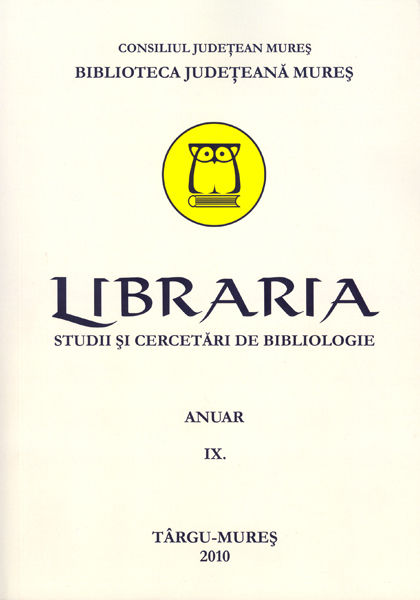Bibliotecile Blajului, modernizarea educaţiei şi dezvoltarea elitelor intelectuale româneşti din Transilvania (1850-1918)
The Libraries from Blaj, the Modernization of Education and the Development of the Romanian Intellectuals from Transylvania (1850-1918)
Author(s): Nicolae Victor FolaSubject(s): Cultural history, Museology & Heritage Studies, Library operations and management, Local History / Microhistory, History of Education, 19th Century
Published by: Biblioteca Județeană Mureș
Keywords: Libraries from Blaj; Romanian education; Romanian culture; Transylvania; Romanian intellectuality; school; Romanian elite;
Summary/Abstract: The investigation of the history of education, considering the arhidiecesane schools, having tradition in Blaj - the Theology Faculty, Superior Secondary School and the Pedagogic Institute - interferes with the appearance of instruction with a pragmatic purpose, the training of the graduates for the integration in different specialized activities of the society. The libraries, as the main scientific components of documentation, have supported the educational and intellectual activities, according to the tradition of the XVIII th century (one of the reasons being the activity of the arhidiecesan printing house). They permanently developed and enriched, not only the particular ones, such as T. Cipariu’s library, which is the most important, but also those of the scholar institute from Blaj. The libraries have expanded the funds for books and they organized themselves according to the law and they enlarged the acquisition of foreign books through the connections with Central European countries and Romanian Kingdom. The influences of Kantian thinking, together with the European liberalism of the time, received on different channels, have contributed to the developement, in moderate forms, of the elements of applied ethics and education, having their own personality in the social background of the time. The same happened to the influences concerning the new European pedagogical methods of learning. Among the graduates, a very important percent have studied the theology - the elite followed theology and philosophy not only at Rome, but also at Viena and Budapest. From those with a higher preparation, we may mention the lawerys, engineers and physicians.
Journal: Libraria. Studii și cercetări de bibliologie
- Issue Year: IX/2010
- Issue No: 9
- Page Range: 186-207
- Page Count: 22
- Language: Romanian

